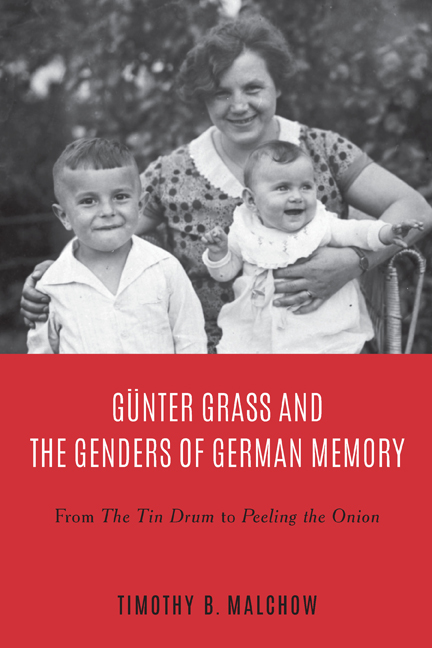Book contents
- Frontmatter
- Dedication
- Contents
- Acknowledgments
- Abbreviations, Translations, and Transcriptions
- Introduction
- 1 Grass’s Biography in Context: 1927–1959
- 2 Corporeal Memory, Trauma, and Art in The Tin Drum
- 3 Bildung, Heimat, and Gendered Modes of German Memory in The Tin Drum
- 4 A Patriarchal Arbiter of German Cultural Memory and His Feminized Others: Leveling Bildung, Opening Heimat, and Championing Art from the 1960s to the New Millennium
- 5 Grass’s Early Life Once Again: Broken Silence, Mourning, and Gendered Approaches to Memory in Peeling the Onion
- Epilogue
- Works Cited
- Index
2 - Corporeal Memory, Trauma, and Art in The Tin Drum
Published online by Cambridge University Press: 09 February 2021
- Frontmatter
- Dedication
- Contents
- Acknowledgments
- Abbreviations, Translations, and Transcriptions
- Introduction
- 1 Grass’s Biography in Context: 1927–1959
- 2 Corporeal Memory, Trauma, and Art in The Tin Drum
- 3 Bildung, Heimat, and Gendered Modes of German Memory in The Tin Drum
- 4 A Patriarchal Arbiter of German Cultural Memory and His Feminized Others: Leveling Bildung, Opening Heimat, and Championing Art from the 1960s to the New Millennium
- 5 Grass’s Early Life Once Again: Broken Silence, Mourning, and Gendered Approaches to Memory in Peeling the Onion
- Epilogue
- Works Cited
- Index
Summary
READERS FAMILIAR WITH Grass's biography will be struck by the author's frequent use of it in The Tin Drum. The early life that the novel's narrator recalls in his asylum cell between 1952 and 1954 so closely parallels that of its author that Heinrich Vormweg asked in his early Grass biography: “Was Günter Grass Oskar Matzerath?” (War Günter Grass Oskar Matzerath?; 15). Though born three years earlier than Grass, Oskar is also the first child of petty bourgeois grocers, a German Protestant father who becomes a Nazi, and a Kashubian Catholic mother, residing on Labesweg in the Danzig suburb of Langfuhr. He likewise attends Fräulein Spollenhauer's elementary school class and the Church of the Sacred Heart, where Father Wiehnke presides. He witnesses the Night of Broken Glass in Danzig, as well as the defense of the Polish post office, for which one of his Kashubian relatives is executed. After the war, he works as a stonemason in Düsseldorf, spends time at the Art Academy, performs as a percussionist in nightclubs, has sexual encounters of a kind with nurses, and is confused with a murderer.
Historical allusions also appear throughout The Tin Drum. It evokes events that its original German readers would have recognized as part of their collective recent past. Grass lived through many of these moments. The history in the novel includes World War I; the founding of the Free City of Danzig; the reign of Forster, Rauschning, and Greiser in Danzig; Nazi rallies and Reich-subsidized cultural offerings, like the opera in Zoppot; Nazism's popularity among the petty bourgeois; the Night of Broken Glass; the German invasion of Danzig; the battle for the Polish post office and the execution of its defenders; the occupation of Poland; the air war; the Allied landing at Normandy; the Russian occupation of Danzig; postwar reports of a death camp; the westward flight and expulsion of Germans; and the postwar West German currency reform and “economic miracle.” But an examination of the narrative voice reveals that this history provides a mere backdrop for Oskar's more prominent personal story, which he recalls and reconstructs in the narrative present of the early 1950s. History appears simply “in the detail” of this story (Preece 2004, 39).
- Type
- Chapter
- Information
- Günter Grass and the Genders of German MemoryFrom The Tin Drum to Peeling the Onion and Beyond, pp. 68 - 92Publisher: Boydell & BrewerPrint publication year: 2021



